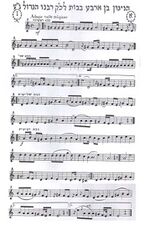Daled Bavos: Difference between revisions
Appearance
No edit summary Tags: Mobile edit Mobile web edit Advanced mobile edit |
No edit summary Tags: Mobile edit Mobile web edit Advanced mobile edit |
||
| (2 intermediate revisions by the same user not shown) | |||
| Line 1: | Line 1: | ||
{{Music}} | {{Music}} | ||
[[File:ארבע בבות.jpg|thumb|150px|Niggun Daled Bavos]] | [[File:ארבע בבות.jpg|thumb|150px|Niggun Daled Bavos]] | ||
'''Daled Bavos''' is a Chabad niggun (wordless melody) composed by [[The Alter Rebbe]], Rabbi Shneur Zalman of Liadi. The | '''Daled Bavos''' is a Chabad niggun (wordless melody) composed by [[The Alter Rebbe]], Rabbi Shneur Zalman of Liadi. The niggun is immensely important and profound and is typically sung at Jewish and [[Chabad holidays]], weddings and other special occasions. | ||
Niggun Daled Bavos consists of four sections which correspond to the four spiritual worlds as described in Kabbalah: Atzilut, Beriah, Yetzira and Asiya. These four sections also parallel four main sections of the morning prayers (Shacharis): Pesukei D'zimrah, the Blessings for Shema, Shema, and Shmona Esreh. | |||
[[Category:Music]] | [[Category:Music]] | ||
[[he:ניגון ארבע בבות]] | [[he:ניגון ארבע בבות]] | ||
Latest revision as of 09:19, 22 February 2025
| Part of a series on Music in Chabad |
|---|
 |
| Nigunim |
| Daled Bavos • Bnei Heichala • Ka'ayal Ta'arog • Nye Zhuritze Chloptzi • Ad Mosai • HaRebbe Shlita |
| Collections |
| Nichoach • Gaguim (2014-present) |
| V – T |

Daled Bavos is a Chabad niggun (wordless melody) composed by The Alter Rebbe, Rabbi Shneur Zalman of Liadi. The niggun is immensely important and profound and is typically sung at Jewish and Chabad holidays, weddings and other special occasions.
Niggun Daled Bavos consists of four sections which correspond to the four spiritual worlds as described in Kabbalah: Atzilut, Beriah, Yetzira and Asiya. These four sections also parallel four main sections of the morning prayers (Shacharis): Pesukei D'zimrah, the Blessings for Shema, Shema, and Shmona Esreh.
